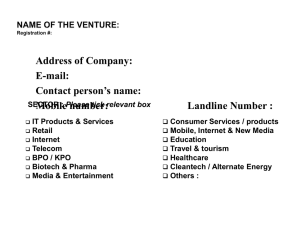More in favour of Approach 1
advertisement
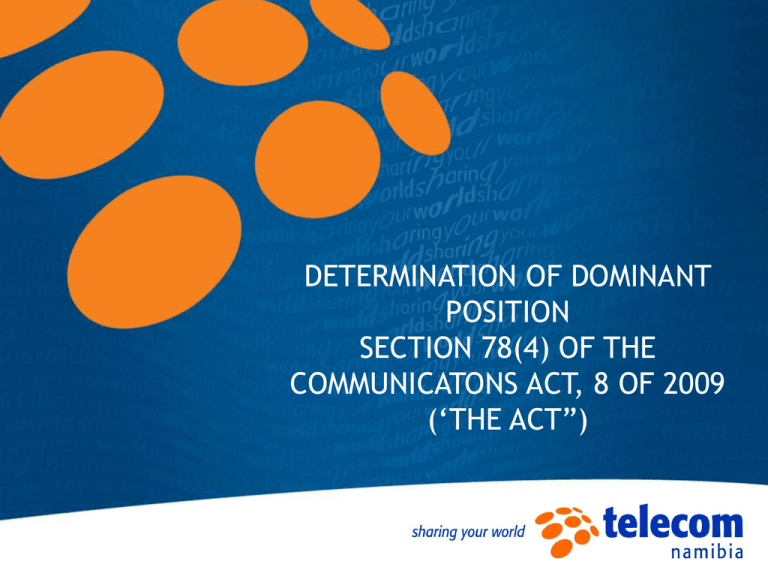
DETERMINATION OF DOMINANT POSITION SECTION 78(4) OF THE COMMUNICATONS ACT, 8 OF 2009 (‘THE ACT”) THE ICT INDUSTRY – WORLD WIDE Information Technology ICT Industry Broadcasting The new converged space. Telecommunications THE ICT VALLUE CHAIN Broadcasting Information technology Content Professional Network Software services services Are we ICT players or not? Telecommunications Network Terminal & Access provider peripheral networks & carrier equipment New services are generally high growth but low margin. We are entering a post voice digital era SMS/MMS and other Mobile Data 60% 50% Internet Advertising EBIT Margin 40% 30% Mobile Voice PSTN Voice IPTV Advertising Mobile Music Mobile B/Band Online Gaming 20% 10% Mobile Advertising B/Band Access IT Services 20% IPTV Online Music Mobile TV VoIP 40% 60% 80% 100% Compound growth / annum 2007 - 2012 Source: Gartner/IBM LICENSE • Telecom in terms of Section 45 of the Act, holds a technology neutral license to render telecommunication services. • This license is similar to which has been issued to AOL, MTC and WTN. Therefore: The market definition to be relevant to the new converged ICT industry. Relevance of class of service? Requirements of Section 78(4) for determination of a licensee to be dominant a) b) c) d) Licensee in question has such a share of the market in the class of telecommunications services in question, that it is able to act independent of its competitors; The licensee controls some infrastructure that is necessary for the provision of the services in question; The licensee is dominant as provided in paragraph (a) and (b) in respect of a class related services (which need not be telecommunications services) and the licensee can use that dominance to exercise power in the market for the telecommunications services; or The licensee in question has a position in a market in another country or a relationship with providers in another country that can be used to exercise market power in respect of the relevant class of telecommunications service in Namibia. Relevance of class of service? HOW DOES TELECOM NAMIBIA COMPARE WITH THE ABOVE? a) Does not have a significant share in the market; b) Yes, it does control some infrastructure that is necessary for the provision of the service by virtue of history and our previous statutory duty of social responsibility; c) Telecom is not able to dictate the market due to insignificant amount of customers and low profit margins. d) Telecom further does not have a position in a market in another country in comparison to MTC who: Continue… • Have a 34% foreign shareholding; • Has the back up of a strong matured player in Portugal • Has access to their intellectual property; and WTN who: • Operating in regional markets – South Africa, Zimbabwe, Zambia and Angola. Telecom has equity in Communitel in RSA, a very small entity and does not have any significant impact in the RSA market. MARKET SHARE In general a company/firm is considered to be dominant based on its market share. In this respect CRAN should in order to determine the dominant position not look at the individual services provided by the different carriers but look at dominance as one i.e compare market power of MTC vs Telecom and also compare financial statements. TELECOM MTC Revenue 1,454,957 1,159,683 EBIDA% 53.2% 24.5% Customers 1,854,700 213,665 COMPARISON TELECOM VS MTC 100% 90% 80% 70% TN 60% MTC 50% 40% 30% 20% 10% 0% Turnover EBITDA Customers SUMMARY Being marginalised as an infrastructure provider. • We are now in an era where fixed and mobile networks have converged and an ICT industry at play. Infrastructure as such becomes irrelevant. • We are also witnessing a service and technology neutral licensing regime. Infrastructure as such becomes irrelevant. • As a result, Market power becomes blurred and and therefore Telecom Namibia does not consider itself having market dominance. Infrastructure alone cannot determine market power. Class of fixed line infrastructure is not relevant CONCLUSION The preferred Approach • The Botswana definition preferred. Dominant position? means a situation in which one or more enterprises possess such economic strength in a market as to allow the enterprise or enterprises to adjust prices or output without effective constraint from competitors or potential competitors; More in favour of Approach 1 • The ICT Regulatory Toolkit should define all players in the ICT industry. Based on annual financial statements, market share based on turnover can be determined easily.
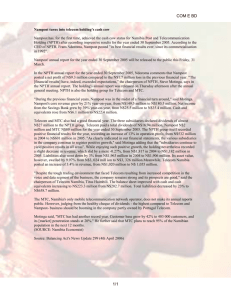



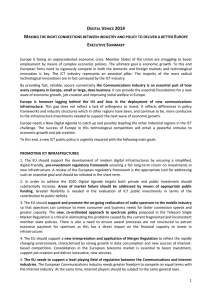



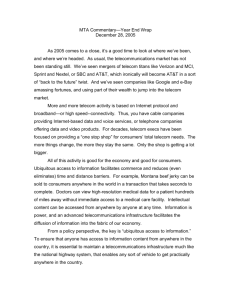
![Slide Show [] - University of Engineering and](http://s3.studylib.net/store/data/009456754_1-617bd9fa7637b72fd54be4f9de67b9cc-300x300.png)
